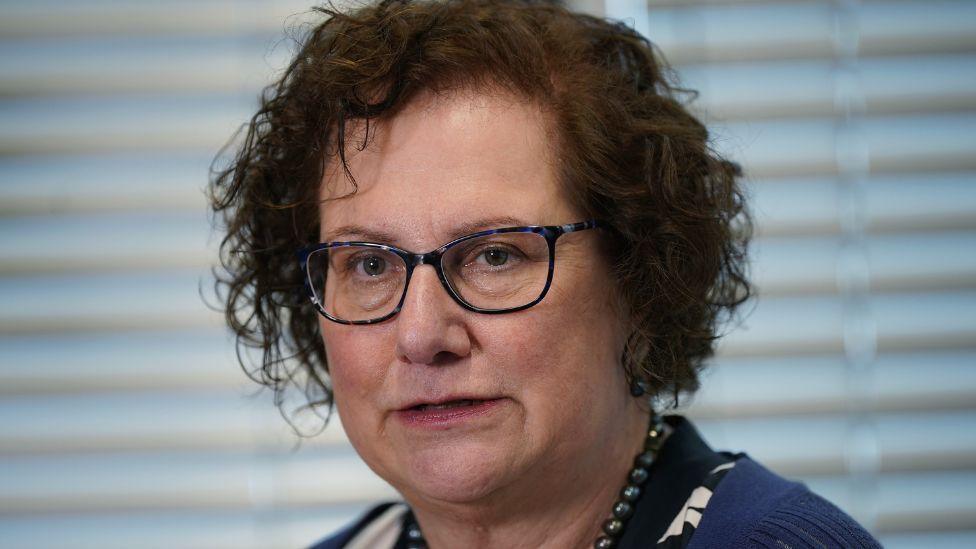Cass Review author calls for 'holistic' gender care

Dr Hilary Cass has called for a holistic approach to caring for young people
- Published
The author of a major review into gender services for under-18s in England has told MSPs that Scotland could benefit from adopting a more "holistic" approach to children's services.
Giving evidence to Holyrood's Health, Social Care and Sport Committee, Dr Hilary Cass said young people with "gender distress" also often had struggles with mental health, neurodivergence or family issues.
Following the publication of her review, Scotland's NHS paused prescribing puberty blockers to children referred by its specialist gender clinic.
The Scottish government said it was considering the review's findings.
Scotland's under-18s gender clinic pauses puberty blockers
- Published18 April 2024
What's happening with children's gender care in Scotland?
- Published29 October 2024
Gender care review author attacks 'misinformation'
- Published20 April 2024
Dr Cass told the committee that young people questioning their gender deserved the same standard of evidence as is applied in other areas of children's medicine, but there was insufficient evidence into the potential adverse effects of prescribing puberty blockers.
She said there had been "significant misinformation" circulated about evidence gathered on the efficacy of puberty blockers.
MSPs heard Scotland could benefit from becoming a regional UK centre were research and data could be shared, while improving services that focus on mental health or anxiety would help children.
Dr Cass said it was not for her to comment on any political opinion in Scotland about her review but only to answer questions on the conclusions she had made.
It came after Scottish Greens co-leader Patrick Harvie refused to accept the Cass Review as a valid scientific document.
That contributed to a build up in tension with the SNP, which ultimately led to the collapse of the Bute House power-sharing agreement and the end of Humza Yousaf's reign as first minister.
Mr Yousaf said Mr Harvie's response was not "not necessarily" a factor in his decision to end the Bute House agreement.
'Toxic' debate
Dr Cass said the “single most important take away” from her review was that options should not “foreclosed too soon” for young people who are questioning their gender identity.
“A small number of these young people are going to benefit from a medical pathway for their gender distress," she told MSPs.
“But equally for probably a larger number their gender distress is going to be solved in myriad other ways – whether that is has been a sort of developmental questioning period that spontaneously resolves or whether they resolve uncertainty about their sexuality and then their gender questioning resolves.
“Or whether they find that they don’t want a very rigid medical pathway but just remain gender fluid or gender non-conforming in the longer term.”
Dr Cass also warned gender questioning children experiencing "distress" were being passed to identity clinics because many doctors were "fearful" of the toxic debate about the issue.

Pro-trans activists protested outside the Sandyford clinic in Glasgow last month
Dr Cass said the review found that masculinising and feminising hormone treatments were appropriate for some young people, but that evidence was much less clear for puberty blockers.
“There is no evidence that it buys time to think,” she said, adding that the “vast majority” of those who go on puberty blockers do then go on to hormone treatment.
“So it may be that it is altering the trajectory and making it less likely that once you start you will reconsider the options because you haven’t gone through your own puberty, you haven’t gone through that psycho-sexual pathway,” Dr Cass said.
She told the inquiry there was no evidence that puberty blockers improved self-body image. She said one Dutch study had found “weak evidence” that they improved mental wellbeing, but no other study had “really replicated that”.
She said the one indication her review found was that they may be helpful, particularly for birth-registered males to prevent irreversible changes.
However, she told MSPs a drawback of puberty blockers, which she said had become “almost totemic” as the route to get on to a treatment pathway, was they stopped an examination of other ways of addressing young people’s distress – including “evidence based” treatment such as psychological support or medication.
Transition 'sweet point'
Green MSP Gillian Mackay cited concerns that the review suggested a gender transition was the "worst outcome" for young people.
Dr Cass said a medical transition was a really important option for people who were going to have a long-term trans identity. “And one from which many people do benefit.”
But she warned the “risk” of starting that transition at a point when someone is still in the process of development is you give treatment to wrong person.
“The reason that is a negative outcome is because medical transition does not come without costs in terms of effect on sexual function, fertility, knowns and unknowns about long-term bone health risk, the limitations of surgery.
“All those costs which are well worthwhile if you have a long-term, stable trans identity but it’s a high cost to pay if, in the longer term, you don’t.”
She said picking the “sweet point” where medical professionals have a high level of certainty they are giving the treatment to the right people is “very important”.
Dr Cass’s appearance at the committee came a month after the closure of a Scottish government consultation on ending conversion practices for sexuality or gender.
Scotland seeks opinions on conversion therapy laws
- Published9 January 2024
What is conversion therapy and will it be banned?
- Published20 September 2024
“Everyone should be protected from conversion therapy,” Dr Cass said. “It’s a completely unacceptable practice.”
However, she raised concerns that a ban could lead to legitimate therapists being fearful of prosecution if the young person they were treating changed their gender identity during their treatment.
“I don’t know how we get that balance right of protecting people from conversion therapy and not frightening therapists who are just doing their job and having an appropriate exploratory conversation with a young person,” Dr Cass added.
A Scottish government spokesperson said: "The Cass Review is a comprehensive and valid scientific document. In line with NHS England - for whom the report was commissioned - we are considering all of the recommendations.
"A multi-disciplinary clinical team within the office of the chief medical officer in the Scottish government - including people with paediatric, pharmacy and scientific expertise - is leading this work.
"The chief medical officer will provide a written update to parliament on the outcome of that clinical consideration process before the summer recess."